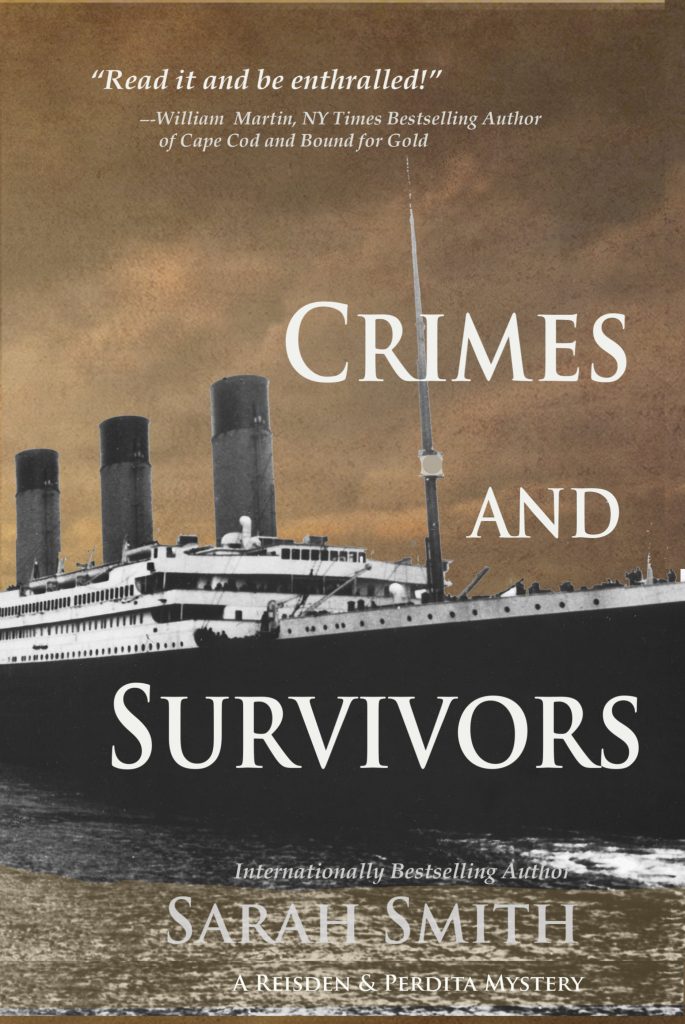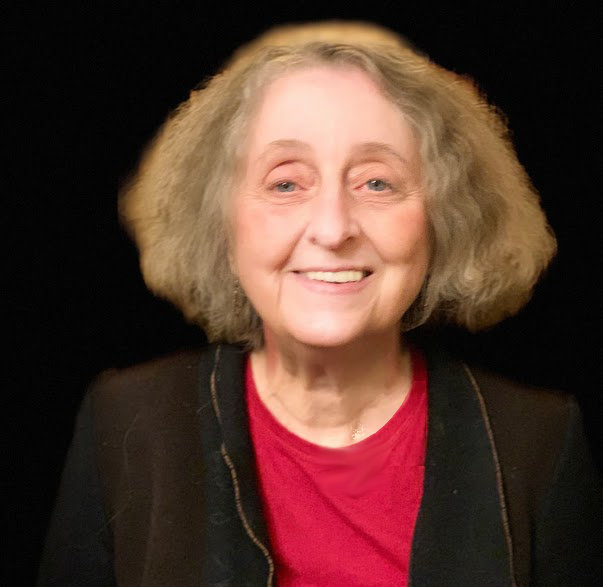Sarah Smith is a time traveler! Although we New Englanders know Sarah as an indefatigable supporter of the local crime fiction scene, to readers worldwide she is the Agatha Award-winning (and New York Times notable books) author of Chasing Shakespeares (yes, plural!), which was the first of Sarah’s books I read, as well as the Vanished Child (Alexander Reisden and Perdita Halley) series. In all these books, Sarah has a way of bringing the past alive – and letting us into some of its biggest mysteries. This month, Sarah dives deep to get into the Titanic and so much else that was going on in 1912 (Jim Crow, etc.) with a new Reisden/Halley book, Crimes and Survivors. And although her Titanic-themed party has been postponed thanks to the coronavirus, the virtual celebrations begin here. Strike up the band!

Thanks for coming here, Sarah. So tell me, how does a book start for you?
With a whole lot of little fragments that I throw in a bag and shake. Crimes and Survivors started with
- A book about the Titanic, because Titanic
- An idea about a woman who’d always thought she was white, but found out that her father/grandfather might have been passing for white. If Titanic, then 1912, so it’s the height of Jim Crow.
- The autobiography of Louis Patterson, one of the first of the black detectives—amazing things he did! He was crying out to be a character
- The discovery that no black people were allowed aboard Titanic
Then I try to make sense of them.

Who in your latest book has surprised you most – and why?
Originally the woman was a minor character, Caroline Church, the daughter of an American living in Paris. But every scene I wrote with Callie stank like dead fish. I couldn’t figure her out. She asks my series detectives to investigate her father’s story. But why would she want to know anything? This is 1912, the era of Jim Crow. She and her father have kept it secret this long. He’s dead. She’ll shut up.
And then I realized Callie was only a mirror, one of those characters that appear in drafts of a story when there’s something unrealized about another character. Get rid of the mirror character and the other character will get more complex.
And I knew who the other character was.
Scariest moment of my life.
When and/or where is your latest book set and is there a story behind that setting?
Yes, and it’s always the same story… Man and woman get on Big Boat. They’re in love, really they are, but they’re fighting. Bang goes the iceberg. “I loved you all along!” she says. “Be brave, little woman,” he says, “I’ll see you in New York.” She goes over the side, he goes into the drink.
(She takes up the entire door, like a cat on a double bed.)
And that’s the end of the story.
It’s a good story, love and redemptive sacrifice. But I could think of a few other things to do with it.
What are you working on now?
I’m marketing Crimes and Survivors with some videos. People love seeing Titanic videos, and I love making them and signal-boosting good ones by other people.
For actual writing, I’m working on a completely different project, set in Brazil during the nineteenth century.
And I have this modern thing involving mediums that I think I’ve finally figured out how to approach…
Which question didn’t I ask you that I should have?
How are you handling bringing out a book in the middle of the coronavirus?
We’re all in this together and we’re yearning to be together. One of the teachers at our local school reads to her students online every day. Caroline Leavitt, Barbara Samuel, and others are sharing videos. The Metropolitan Opera is streaming opera. The citizens of Florence sing to each other from their isolation, and in Wuhan, people bring their food to the balconies of their apartments and share dinner at a distance.
I’m connecting with as many people as I can, especially since my book is about survival. My character Perdita, who’s survived Titanic, wants to be back there, “on the deck of Titanic, with all the lifeboats gone.” There, people would tell the absolute truth to each other, treat each other as fellow humans, say how much they mean to each other. From that comes her lifesaving vision of what survival means: Survival is connection.
As Reisden says at the end of the book, “We are each other’s lifeboats.”
Maybe if that vision of survival reaches only one person who really needs it, I’ve done my job.
(Blatant self-promo: I’ll be posting videos, touring virtually, and bringing out Crimes and Survivors (and all the other eBooks) at $2.99. The first three books in the series are out now. Signed copies of Crimes and Survivors are available for preorder through my local independent, the Brookline Booksmith. More details on www.sarahsmith.com
Sarah Smith’s young adult ghost thriller, The Other Side of Dark, won both the Agatha (for best YA mystery of the year) and the Massachusetts Book Award for best YA book of the year. Her Chasing Shakespeares has been called “the best novel about the Bard since Nothing like the Sun” (Samuel R. Delany) and has been turned into a play. Her Edwardian mysteries starring Alexander von Reisden and Perdita Halley have been published in 14 languages and have reached bestseller status here and abroad. They have been named New York Times Notable Books twice, have received starred reviews
Her book about the Titanic, starring series characters Alexander von Reisden and Perdita Halley, will be published in April 2020.

“Survival is connection.
As Reisden says at the end of the book, “We are each other’s lifeboats.”
Maybe if that vision of survival reaches only one person who really needs it, I’ve done my job.”
Thank you, Sarah. You’ve said what we all needed to hear.
Oh, Lisa, thank you. The feeling is mucilage!
I am always in awe of Sarah’s intellect and energy. Since I must be one of the 1% who did not see the Titanic film, I’m definitely up for this novel. It’s going onto my KIndle as soon as possible.
Vert entertaining post.
Thanks, Judy! Sad that we can’t be together at Natick this year. Hope you and Hans are staying safe. XOXO Sarah